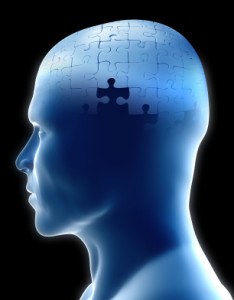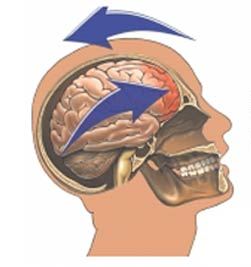General Information
- A concussion is a relatively mild form of traumatic brain injury that causes temporary neurological changes such as disorientation or confusion, amnesia (memory loss for recent events) and unconsciousness for up to several minutes.
- The reasons behind disorientation or loss of consciousness after a mild head injury are not clear. However, in experimental animal models of concussion, the brain injury triggers a brief period of increased brain metabolism, or activity, followed by a period of depressed brain activity before a return to normal after several days. Neuroscientists suspect similar changes may occur after human concussion.
Symptoms
- Symptoms of post-concussive syndrome include headache, irritability, anxiety, difficulty with memory and perception, impaired concentration and attention, fatigue, personality changes, insomnia, dizziness, ringing in the ears, hearing loss, visual changes, increased sensitivity to light and noise, decreased taste and smell, and decreased sex drive.
Diagnosis
- All patients who sustain a concussion should be evaluated by a physician.
- Most people with a mild concussion who maintain normal brain function will not require hospital admission but should be observed by a reliable companion for at least 12 hours after release from the emergency room.
- In a minority of concussion patients, a more serious head and/or brain injury may occur.
- Signs of serious injury include drowsiness or confusion, nausea or vomiting, severe headache, convulsions, drainage of cerebrospinal fluid from the ear or nose, weakness or loss of feeling in the extremities, asymmetry of the pupils and double vision.
- In these individuals a more thorough evaluation and closer observation is recommended because the concussive event may have caused a skull fracture and/or bleeding over the surface of the brain (epidural or subdural hematoma) or in the brain (cerebral contusion).
- Computed tomography (CT) or magnetic resonance imaging (MRI) brain scans identify any bleeding in the brain or over the surface. Most patients with more severe symptoms require hospital admission and observation.
Treatment
- Post-concussion syndrome has no standard treatment. Consequently, treatment is highly individualized and best managed by a neurologist or neurosurgeon.
Outcome
- Recovery after brain injuryvaries widely.
- Symptoms in about 50 percent of patients sustaining a concussion will resolve themselves within a few days of injury, although memory loss for events immediately before and after the injury is usually permanent.
- For the remaining 50 percent of concussion patients, particularly those with more severe forms of concussion, persistent changes may last three to six months or even up to a year after injury.
- In a few patients, a complete recovery never occurs.







